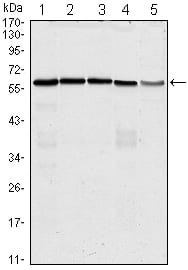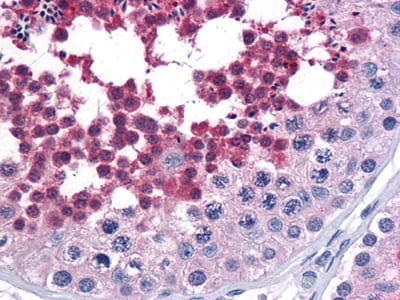

| WB | 咨询技术 | Human,Mouse,Rat |
| IF | 咨询技术 | Human,Mouse,Rat |
| IHC | 咨询技术 | Human,Mouse,Rat |
| ICC | 技术咨询 | Human,Mouse,Rat |
| FCM | 咨询技术 | Human,Mouse,Rat |
| Elisa | 咨询技术 | Human,Mouse,Rat |
| Aliases | CDC25; CDC25C |
| Entrez GeneID | 995 |
| clone | 1F12 |
| WB Predicted band size | 58kDa |
| Host/Isotype | Mouse IgG1 |
| Antibody Type | Primary antibody |
| Storage | Store at 4°C short term. Aliquot and store at -20°C long term. Avoid freeze/thaw cycles. |
| Species Reactivity | Human |
| Immunogen | Purified recombinant fragment of human CDC25C expressed in E. Coli. |
| Formulation | Purified antibody in PBS with 0.05% sodium azide. |
+ +
以下是关于Phospho-TSC2(T1462)抗体的3篇代表性文献摘要:
1. **文献名称**:Akt regulates growth by directly phosphorylating Tsc2
**作者**:Inoki, K. et al.
**摘要**:研究证实Akt通过磷酸化TSC2的T1462位点抑制其功能,阻断mTORC1信号抑制,促进细胞生长。该抗体用于Western blot检测胰岛素刺激后TSC2磷酸化水平。
2. **文献名称**:TSC2 is phosphorylated and inhibited by Akt and suppresses mTOR signalling
**作者**:Manning, B.D. et al.
**摘要**:揭示了Akt介导的TSC2-T1462磷酸化在肿瘤发生中的作用,抗体用于验证TSC2磷酸化与结节性硬化症中mTOR通路异常激活的关联。
3. **文献名称**:Phosphorylation and functional inactivation of TSC2 by Erk
**作者**:Ma, L. et al.
**摘要**:发现Erk激酶也可磷酸化TSC2-T1462位点,该抗体帮助证实不同信号通路对TSC2的交叉调控,及其在癌症耐药性中的作用机制。
注:以上文献均发表于《Nature Cell Biology》等高水平期刊(2002-2005年间),聚焦TSC2磷酸化调控机制,相关抗体被广泛用于机制验证实验。实际引用时建议核对具体文献版本。
Phospho-TSC2 (T1462) antibody is a research tool designed to detect the phosphorylation of TSC2 (tuberous sclerosis complex 2) at threonine residue 1462. TSC2. in complex with TSC1. functions as a critical tumor suppressor by inhibiting the mTORC1 signaling pathway, which regulates cell growth, proliferation, and metabolism. Phosphorylation at T1462 is a key regulatory mechanism that modulates TSC2 activity. This site is primarily targeted by Akt (PKB), a serine/threonine kinase activated downstream of growth factor signaling via the PI3K pathway. When phosphorylated, TSC2 loses its ability to inhibit Rheb, a small GTPase that activates mTORC1. thereby promoting mTORC1-driven anabolic processes.
The Phospho-TSC2 (T1462) antibody is widely used in studies investigating cellular responses to growth factors, insulin, or other stimuli that activate Akt. It helps researchers assess the activation status of the PI3K/Akt/mTOR pathway, which is frequently dysregulated in cancers, metabolic disorders, and neurological diseases. This antibody is commonly applied in techniques like Western blotting, immunoprecipitation, and immunofluorescence to analyze phosphorylation-dependent TSC2 interactions or localization. Its specificity for the phosphorylated form allows differentiation between active and inactive states of TSC2. making it valuable for studying pathological conditions linked to mTOR hyperactivity, such as tuberous sclerosis complex, cancer progression, and insulin resistance. Proper validation using appropriate controls (e.g., phosphorylation-deficient mutants) is essential to ensure accurate interpretation of results.
×